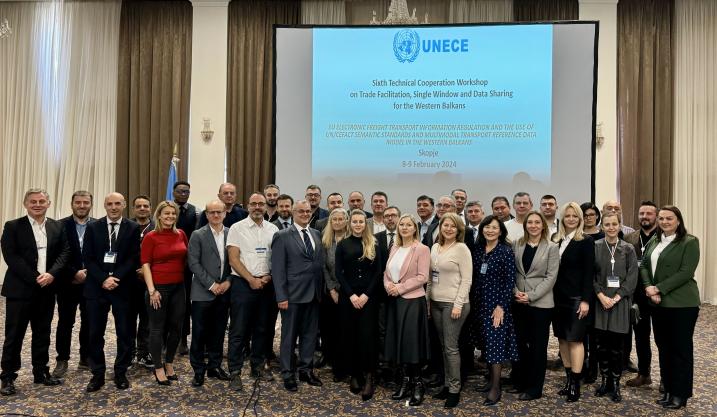Sixth Technical Cooperation Workshop for the Western Balkans
Sixth Technical Cooperation Workshop for the Western Balkans
EU’s Electronic Freight Transport Information Regulation and the Use of UN/CEFACT Semantic Standards and Multimodal Transport Reference

Background
This event follows is part of a sequence since 2006 of regional technical cooperation workshops in the Western Balkans on trade facilitation, single window, and data sharing along digital trade corridors. This year the workshop will respond to the need of the regulatory agencies and business community the Western Balkans to deepen the process of European integration, and focus on the roll out of the EU Regulations 2022/2399 establishing the European Union Single Window Environment for Customs and 2020/1056 on Electronic Freight Transport Information (eFTI) as they are related to the implementation of UN/CEFACT recommendations, semantic standards and Multimodal Transport Reference Data Model (MMT RDM).
Introduction and Registration
The objective of the workshop is to assist relevant stakeholders in the Western Balkans, notably ministries of transport, trade, digitalization, customs, other regulatory agencies, and the business community to use the UN standards and implement the EU legislation. It also aims at assisting implementers of Single Window projects in keeping track with the implementation of relevant new additions to the acquis communautaire. The seminar will be organized as a structured training for better understanding of the EU regulations, and how UN/CEFACT global semantic standards and reference data models help achieve them. The eFTI Regulation, adopted in July 2020 to be implemented in five years, aims at providing opportunity to the private sector to exchange with competent authorities all information on the transportation of commercial cargo inside the European Union in a multimodal and electronic format. It offers a foundation for the transition from exchanging paper or electronic documents accompanying goods in international trade and transport to electronic exchange of data and data sets. Aligned and standardized information exchange on this level will very much benefit the collection of data and functioning of Single Window systems. Knowledge about these developments is very much in the interest of the Western Balkan countries, which aspire accession to the EU.
The use of UN/CEFACT global standards and reference data models is discussed at the Digital Transport and Logistics Forum (DTLF): an expert group of the European Commission bringing together public and private stakeholders from various communities to support the European Commission in promoting digital transformation, notably for the development of corridor freight information systems based on interoperability of data. The workshop will aim at harnessing the knowledge accumulated in this forum to the benefit of stakeholders in the region.
Important objective of the Workshop will be to establish in the countries, at this stage, the link between the business and regulatory agencies that are responsible for implementation of this EU regulation on Electronic Freight Transport Information and Single Window Environment for Customs. Therefore, participants will be invited from the government institutions as well as private sector (transporters, forwarders, exporters, and importers) to come to this workshop.
Establishing cooperation between the countries of the Western Balkans is an important undertaking. The connection between the European Union legislation on electronic freight transport information, customs single window environment, and maritime single window and the UN/CEFACT standards and Multimodal Transport Reference Data Model will contribute to more efficient transport and trade in the region, the queues at the border crossings will be reduced, and the existing bottlenecks will be greatly reduced. A recent study estimated the savings from implementing the EU Regulation on eFTI could be over EUR 20 million annually in the region and EUR 27.3 million annually when kit is fully implemented.
As the internal mechanism of implementing the two Regulations covers the internal information exchange in the European Union, the progress in its implementation is not well known in third countries, including countries aspiring accession to the EU. For this reason, stakeholders requested UNECE to organize this webinar to raise awareness among the regulatory agencies and the business community in the country about the developments in the European Union, and how relevant UN/CEFACT tools can help.
UNECE is currently supporting pilot testing projects and will be delighted to discuss further projects with stakeholders in the region.
The workshop will involve representatives from the Western Balkans, UNECE, the European Commission, the World Bank, CEFTA, UNCTAD/ASYCUDA, the Transport Community in the Western Balkans, and other stakeholders on trade facilitation and the Single Window.
For more information, please contact Mr. Mario Apostolov, Regional Adviser, ECE Economic Cooperation and Trade Division: [email protected], tel. +41 79 2790936; Mr. Zoran Jolevski: [email protected].
To join the workshop online, please register at the hyperlinks
Agenda
Background and Reference Documents
- The package of standards and tools for digitalization of multimodal data and document exchange is available at on the on the project web site
- A streamlined web presentation of the UN/CEFACT standards
- Information on the UN/CEFACT projects
- The Roadmap for the digitalization of multi-modal data and document exchange along the Trans-Caspian Corridor, using UN legal instruments and standards adopted by the Presidents of the SPECA participating States at the SPECA Summit, 24 November 2023 in Baku.
- Materials from the Seminar “Trade Facilitation and Digital Transformation of multimodal information exchange in Eastern Europe and SPECA, Using United Nations Standards” in hybrid format in Baku, Azerbaijan, 22-23 May 2023.
- E-learning tool for the implementation of the standards.
Presentations

